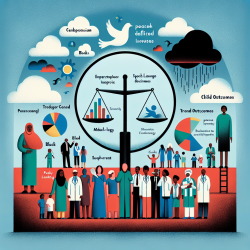Introduction
As practitioners in the field of speech-language pathology and other health professions, we have a profound responsibility to not only provide care but also to uphold ethical standards and advocate for justice. The recent report by the Lancet Commission on medicine, Nazism, and the Holocaust, released in November 2023, underscores the importance of integrating historical context into health professions education. This blog explores how the insights from this report can enhance our practice and encourage further research.
Understanding the Historical Context
The report emphasizes the necessity of teaching the history of medicine during Nazism and the Holocaust as part of health professions education. This historical context is crucial for developing morally courageous health professionals who can recognize and prevent crimes against humanity. By understanding the past, practitioners can better navigate the ethical challenges of today, ensuring that they do not become complicit in injustices.
Key Outcomes from the Report
- Detection and Prevention: The report highlights the importance of equipping health professionals with the skills to detect and prevent atrocities. This involves understanding the signs of discrimination and taking proactive steps to address them.
- Care for Victims: Providing compassionate care to victims of atrocities is a fundamental aspect of medical practice. The report encourages practitioners to be empathetic and supportive, ensuring that victims receive the care they need.
- Upholding the Healing Ethos: The healing ethos is central to the practice of medicine. Practitioners must prioritize patient care and maintain ethical standards, even in challenging circumstances.
- Fostering Morally Courageous Professionals: The report calls for the development of health professionals who are informed by history and willing to speak up against injustices. This involves creating an educational environment that encourages critical thinking and ethical decision-making.
Implications for Practitioners
For practitioners, integrating these lessons into daily practice can lead to improved outcomes for patients and communities. By being informed about historical injustices, practitioners can better understand the social determinants of health and address the root causes of health disparities. This knowledge also empowers practitioners to advocate for policies that promote equity and justice.
Encouraging Further Research
The Lancet Commission report serves as a call to action for further research into the intersection of history, ethics, and health professions education. Practitioners are encouraged to explore how historical events have shaped current medical practices and to identify areas where improvements can be made. By conducting research and sharing findings, practitioners can contribute to a more just and equitable healthcare system.
Conclusion
The insights from the Lancet Commission report on medicine, Nazism, and the Holocaust are invaluable for health professionals. By integrating this historical context into education and practice, we can develop morally courageous practitioners who are equipped to address the ethical challenges of today. To read the original research paper, please follow this link: The Hamas massacre of Oct 7, 2023, and its aftermath, medical crimes, and the Lancet commission report on medicine, Nazism, and the Holocaust.










